This article got a medal for being a good article!
Check out a list of Good Articles too!
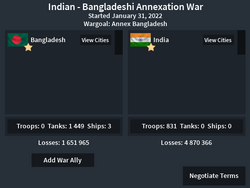
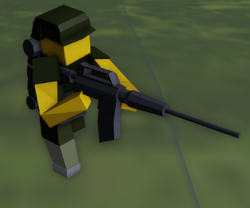
A war is an armed conflict between the armed forces of two or more nations. War is justified and declared by only player-controlled nations, prompting the targeted country (along with any existing allies or a faction) to enter the conflict.
The nation that declared war will proceed to achieve specific objectives, which are categorized under four main types of justifications: Conquest (annex cities), Liberation (liberate oppressed releasables), Subjugation (puppet nation), and in a rarer case, Independence (break free from puppet overlord).
Description
Offense Vs. Defense
When one or more nations engage in a war, the primary goal of the offending side is to occupy enough of the opponent's cities until they capitulate (requiring control of at least 90% of the cities), using infantry or tanks, while boasting additional support such as artillery, anti-aircraft defenses, navy, and the air force. Conversely, the defensive side, comprising one or more nations that were declared, must repel the offensive as much as possible, before counterattacking or negotiating a peace treaty if the attacker's side operation fails.
Mutually, both sides will utilize a variety of military units, ranging from basic infantry and tanks to as powerful as aircraft carriers and nukes. They will also use various modifiers, including doctrines, operations, technologies, political leaders, military leaders, readiness, training, strategic maneuvers (such as frontline formations, entrenchment, and flanking), and more, to gain superiority and secure victory in the war.
Peace Treaties
If the war ultimately results in a stalemate, where no side is victorious or defeated, then one side is able to request a "white-peace" (WP), where no conditions are enforced and the war is concluded, besides an inherent 2-year truce that occurs between every war, no matter the outcome.
However, if a nation (or multiple nations) emerges victorious, defined as capturing at least 90% of the enemy's cities, they are able to dictate the terms of the peace treaty according to their discretion. This will automatically force the losing nation(s) to accept the terms, even if the player or AI did not manually agree. Player-controlled nations (excluding AI-controlled) also have the option to utilize the 'Concede Terms' mechanism. This feature allows them to propose a surrender treaty to the opposing side, which the opposing side can either accept or reject based on the conflict's context.
In the case of a faction or puppet, if the winning nation(s) successfully win against the faction or puppet leader, they cannot sign a treaty with the nations associated with the faction or the puppet states, excluding the faction or the puppet leader.
Drawbacks During War
There are numerous drawbacks when engaging a war, such as reduced population growth, formables/missions unable to be formed, the ceding mechanism becomes locked (excluding transfer occupation), etc. Additionally, war also introduces a major threat: war exhaustion. During an intense and prolonged war, war exhaustion could inflate, caused by engaging in many wars simultaneously, accumulating high military losses, losing a substantial amount cities, and more, crippling the belligerent's economy, military, and stability, causing their releasables to declare independence if war exhaustion is rampant.
As a result, it is extremely important to keep war exhaustion at a low or moderate level, using modifiers such as certain doctrines, Socialism and Communism ideologies (mitigation is increased with ideological power modifiers), Security Spending, certain formable modifiers, and more, or simply staying at peace.
Impacts of War
Wars are among the most intense events in the game and are consistent from the early stages until the server's conclusion. In public matches, conflicts between player-controlled nations and AI-controlled nations are prevalent, with territorial expansion through AI-controlled countries being a primary method of growth. However, Player vs. Player (PvP) wars are typically more intense and devastating, as there are higher military losses and more intense combat. While less common than Player vs. AI-controlled wars, PvP wars are more significant.
Justification and Declaration
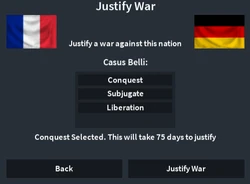
![]() Visit main article: War Justification
Visit main article: War Justification
Casus belli (Latin for "cause of war") is a reason to go to war with another nation, and in the game it is known as War Justification. To justify one will choose three types of wars with their respective goals and accomplishes: Conquest, Liberation, and Subjugation. Conquest involves annexing cities, Liberation is to free relesables from their overlord, and Subjugation is to force a nation to become a puppet.
Some justifications can also share mutual terms without conflicting, such as all justifications being able to seize treasury, resources, impose war reparations, and disarm militaries, while Liberation and Subjugation can enforce ideologies. A list of all terms that are accessible corresponding to each justification:
- Conquest: Annex Cities, Seize State Treasury, Seize State Resources, Demand War Reparations, and Disarm Military.
- Liberation: Liberate Countries, Seize State Treasury, Seize State Resources, Demand War Reparations, Enforce Ideology, and Disarm Military.
- Subjugation: Puppet Nation, Seize State Treasury, Seize State Resources, Demand War Reparations, Enforce Ideology, and Disarm Military.
Upon selecting a justification, the total number of days required to complete the justification process will be displayed. For instance, if ![]() France justifies war against
France justifies war against ![]() Germany, the base duration will take 75 days. However, several factors can influence the justification time:
Germany, the base duration will take 75 days. However, several factors can influence the justification time:
- Micro-states (countries with only 1 city) have significantly faster justification times against them.
- The Chief Ambassador reduces the justification time by default.
- The Neutrality Act increases justification time by +300%.
- Disarmament increases justification time by +100%.
- Fascism, Nationalism, Socialism, and Communism ideologies have reduced justification time, while Democracy and Liberalism have longer justification time.
- More ideological power modifiers can boost justification reduction for Fascism, Nationalism, Socialism, and Communism, while increasing justification time for Democracy and Liberalism.
The base amount of diplomatic actions is two, allowing for a maximum of two simultaneous justifications for war, or one if funding rebels against a single nation, and none if funding rebels against two nations. However, there are two methods to expand diplomatic actions: Fascism (+1) and reaching Chief Ambassador level 2 (+1). It should be noted that justifications cannot be made on the same nation more than once simultaneously. For instance, justifying both a Conquest and Liberation war at the same time is not possible. However, if one of the two war justifications is completed, then the second one can be initiated.
Once an alert confirming a successful justification is received, one can declare war against the justified nation by clicking the red button labeled "Declare War", then selecting the type of justification, and finally clicking "Declare War". Access to the red "Declare War" button can be found in the player's country menu. This menu can be accessed through the Diplomacy tab, by clicking on one of their cities and then clicking the flag on the left, or by clicking the player's name in the top-right corner of the player list.
Once war has been successfully declared, the only way to end it is through a treaty, either through a mutual peace agreement (white-peace), one side or the other facing capitulation, or ultimately, one or both sides being crippled by chronic war exhaustion.
Independence War
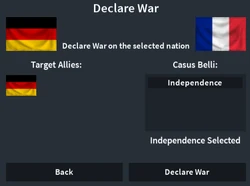
An Independence War is generally a rare type of war that involves a puppet fighting against their overlord to gain independence. An Independence War is not justified, but rather a declaration that can automatically be found in the 'Declare War' panel. However, war cannot be declared against the overlord if it is in a faction, engaged in an existing war (since the puppet will automatically enter the war with the side of their overlord), or in a truce with their puppet.
An Independence War has no exclusive terms in the negotiation panel, as the belligerent can choose all the terms, such as annexing cities, liberating releasables, puppeting, etc.
Adverse Effects
Despite war being known for growing a nation's power on the global stage, there are numerous adverse effects that can negatively impact a nation during war.
- War Exhaustion: is a significant effect that begins to exhaust and cripple certain aspects of a nation during wartime, such as the economy, military, stability, eventually causing widespread unrest, leading cored countries (or relasables) to declare independence. War Exhaustion can occur when declaring multiple wars simultaneously, losing too many cities, or suffering high military losses.
- Population: Population growth is automatically reduced when engaging in a war.
- Stability Hit on Offensive Wars: There are many ways to lose a certain amount of stability upon declaring a war (this excludes being invited to an allied war). The most common way is Liberalism and Democracy, where Liberalism has a negative hit stability of -1% per declaration, while Democracy has -3%. Disarmament can also reduce stability by a massive -10% per war declared.
- There are also other ways to gain a small sum of stability upon declaring a war. The most common way is Communism, Nationalism, and Fascism, in which Nationalism and Communism gain +1% stability of per declaration, while Fascism gains +2%. Popular War Support can also give +1% stability.
War Interface
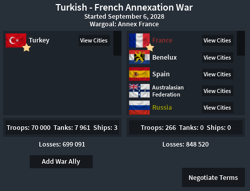
War interfaces can be accessed by clicking on the enemy's flag in the bottom-right corner. This interface displays the title of the war (e.g., ![]() American -
American - ![]() Mexican Annexation War), the start date, lists all belligerents involved, showcases the military composition, and presents the military losses incurred by each side. Hovering over the losses reveals the number of fatalities accumulated by each nation engaged in combat, as total fatalities represent the collective sum of all belligerents on each side.
Mexican Annexation War), the start date, lists all belligerents involved, showcases the military composition, and presents the military losses incurred by each side. Hovering over the losses reveals the number of fatalities accumulated by each nation engaged in combat, as total fatalities represent the collective sum of all belligerents on each side.
War leaders are distinguished by a yellow star, while nations colored green indicate they can be forced into peace (upon losing 90% of their cities; the percentage of captured cities can be viewed by hovering over the enemy's flag in the interface). Nations highlighted in red indicate total collapse.
Nations with allies not already allied or in a truce with every enemy nation can be added to the war using the "Add War Ally" button. When an ally joins a war via an invitation sent by the war leader, they are unable to negotiate a treaty (demand or concede) with enemy countries allied with the opposing leader. However, they can negotiate a treaty with the opposing war leader.
Peace Treaty
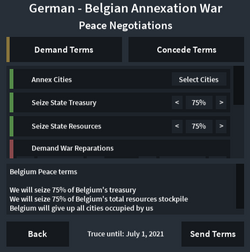
Peace treaties are a form of negotiation between the two war leaders to mutually conclude a war. Peace treaties typically consist of eight terms, which can be demanded, conceded, or left empty, resulting in a "white-peace" where no terms are forced. Demanding terms is the default option, where the effects of the terms apply to the enemy nation. Conceding reverses the process, with the player proposing a surrender treaty to the opposing side, which they can accept or reject. After selecting any terms, a summary of the treaty will appear below for review.
Peace treaties are also automatically imposed if a country manages to capture at least 90% of their enemy's cities, which refers to a method called "force-peacing." When a force-peace occurs, the AI or player-controlled country who negotiated a treaty will have their terms automatically accepted, even if the losing country who received the treaty does not accept with their discretion.
Exclusivities in Treaties
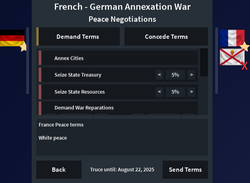
Exclusivities in Treaties is indicated by a red X on the bottom-right corner of the enemy belligerent's flag, located on the right of the war panel. This icon means the country cannot be negotiated via a treaty.
Exclusivities in Treaties CAN be annexed after full invasion of both; the Host Country (e.g. ![]() France, the country with the star icon in the bottom-right corner of the flag) and the puppet country (e.g.
France, the country with the star icon in the bottom-right corner of the flag) and the puppet country (e.g. ![]() Jersey, the country with the red X on the bottom-right corner of the flag).
Jersey, the country with the red X on the bottom-right corner of the flag).
Alliance Wars
Since the war leader can negotiate a treaty with all countries on the opposing side, including both the war leader and their allies, it is crucial for allies to negotiate a peace treaty first against the opposing war leader if they win. If the war leader negotiates first but their allies are unable to do so, the allies will not gain anything in the end.
Therefore, the ally should use transfer occupation to give territory of the enemy countries allied to the enemy leader to their friendly war leader. If they fail to do so, the territory will simply be freed, as the ally cannot negotiate a peace treaty with their counterpart, thus preventing them from making any territorial gains besides annexing the enemy war leader. In addition, this mechanism does not only include territorial annexation, but also all other terms, such as liberate countries, disarm military, seize state treasury and resources, etc.
Alliance Exploitation
Some countries may declare war on AI-controlled nations that are allied with a player, thus dragging the player-controlled nation into the conflict. In such situations, the player has no direct means of withdrawing from the war except by proposing a white peace to the enemy war leader. However, the enemy war leader may refuse this request and continue to engage the player's AI-controlled ally, who is less effective in combat due to being controlled by AI.
Alternatively, the enemy war leader could quickly sign a treaty with the AI-controlled war leader, automatically accepting the terms, and thereby only agreeing to a white peace, effectively ending the war. Consequently, it is highly recommended for player-controlled nations to break ties with AI-controlled nations once the former player has left the server, as these AI allies can inadvertently bring players in wars from which they cannot easily extricate themselves.
However, this exploit should only be used if you are able to successfully invade the player-controlled nation. Otherwise, you are essentially jeopardizing your safety to a more powerful nation even if you can white-peace the AI-controlled war leader.
Faction and Puppet Wars
Members in a faction or puppets engaged in a war (excluding the faction and puppet overlord) cannot be directly negotiated via a peace treaty. However, if the faction or the puppet leader is completely annexed, the faction will disband, and in the context of the puppets, the puppets will be liberated from their overlord. However, this will trigger a 2-year truce with all faction members and puppets.
Treaty Conditions
As mentioned previously, in the peace treaty interface, there are eight terms that can be demanded, conceded, or left unselected. If no terms are selected, the peace treaty will automatically result in a "white-peace." This means that no specific terms will be imposed, and the country proposing the white-peace—either the war leader or their ally—will withdraw from the conflict. As a result, a 2-year truce will be activated between the belligerents of the war from which they withdrew.
Some terms could be locked depending on the war goal that was chosen, or some war goals may share mutual terms (e.g., Liberation and Subjugation can both enforce ideologies). Additionally, right-clicking on the left or right arrows in Seize State Treasury and Seize State Resources will automatically minimize the percent to 5% or maximize to 75%, respectively. For Seize State Treasury and Disarmament, you can also adjust the length of the terms, from 0.5 to 5 years and 0.5 to 3 years, respectively.
| Justification | Term | Description |
|---|---|---|
| Conquest and Independence | Annex Cities |
Upon clicking "Annex Cities," a button labeled "Select Cities" will appear. Using this button will open a separate map where red indicates the cities that will not be annexed and will remain in the opponent's country after sending a treaty, while yellow indicates the cities that will be annexed. Hold the CTRL key and drag the mouse over the cities you want to annex, then click "Back" after selecting the desired cities. This mechanic is useful for force-peacing after taking 90% of your opponent's cities. If your opponent has collapsed entirely, you can simply annex all of their cities without using "Select Cities." Additionally, when using this term to concede, a sufficient number of cities must be captured for it to work. |
| Liberation and Independence | Liberate Countries | Forces a country to release its releasables depending on the amount specified in the treaty. |
| Subjugation and Independence | Make Puppet State | Forces a country to become a puppet for the country that sent the treaty. |
| Liberation, Subjugation, and Independence | Enforce ideology | Forces a country to align its ideology with their opponent country's ideology. Once the treaty goes through, the ideology will automatically convert, introducing the Force Regime Change modifier for 365 days. These effects of this national modifier are:
|
| Conquest, Liberation, Subjugation, and Independence | ||
| White-Peace | While not a term that appears in the treaty compared to the others, this type of term can be initiated by not selecting any term in the treaty (e.g., Annexed Cities, Seize State Treasury, etc.) then clicking the buttons labeled "Send terms" and "Are you sure?" This is a method used to ultimately conclude or withdraw from a war without enforcing any terms. | |
| Seize State Treasury | Seizes a portion of a nation's entire money stockpile, ranging from 5% to 75%. | |
| Seize State Resources | Seizes a portion of a nation's entire resource stockpile, ranging from 5% to 75%. | |
| Demand War Reparations | Seizes a portion of a nation's income from 5% to 25%, with the length ranging from 0.5 to 5 years. Does not work against AI-controlled nations, only player-controlled. | |
| Disarm Military | Introduces the Disarmament national modifier, ranging from 0.5 to 3 years. The effects of this national modifier are:
|
Types of Wars
There are numerous types of wars that can manifest in both public and private servers.
- Player vs AI: This is the most common type of war in a public server, as it involves a player-controlled country fighting against an AI-controlled country.
- Player vs Player: This is one of the many common types of wars, as it involves a player-controlled country fighting against another player-controlled country.
- Alliance War: This occurs when a country declares war on another country, forcing the countries who are allied with the country who was declared to enter the war. Subsequently, the country that declared the war will invite their allies for reinforcements. Alternatively, a country who is typically a superpower could declare war, even without needing allies, to destroy all of the countries associated with the alliance.
- Faction War: This type of war involves a faction declaring war on another faction that co-exists within the server. Alternatively, a country who is typically a superpower could declare war, even without needing allies, to destroy all of the countries associated with the faction.
- Coalition War: A group of smaller and minor countries could form a joint collaboration, either using an alliance or a faction, to collectively fight a larger and more powerful country.
- Proxy War: This involves indirect warfare, as it entails a superpower providing aid—whether in the form of money, manpower, or both—to one or more countries engaged in prolonged or multiple wars.
Trivia
- A list of unique soundtracks will automatically play when a country engages in a war, improving the intensity of the conflict.
- Liberalism and Democracy have an exclusive reduction to justification time and do not receive stability loss when declaring a Liberation war, as this only applies to Conquest and Subjugation. However, the war justification time can increase upon strengthening ideological power modifiers.
Gallery

|
|---|
| Units | ||
|---|---|---|
| Army | Primary | Infantry • Tanks • Home Guard |
| Support | Artillery • Anti Aircraft | |
| Navy | Escort | Destroyer • Frigate • Transport Boat |
| Capital | Battleship • Aircraft Carrier | |
| Underwater | Submarine | |
| Air Force | Fighter • Attacker • Bomber • Transport Aircraft | |
| Nuclear | Nuke | |
| April Fools | Nuke (April Fools) • Space Units | |
| Mechanics | ||
|---|---|---|
| Strategic | Doctrines • Operations • Attrition • Entrenchment • Flanking • Auto Capture | |
| Leadership | Military Leaders • Traits • Political Leaders | |
| Logistics | Manpower • Experience • Military Power • Conscription Laws • Readiness • Military Spending • Recruitment Centers • Reinforcements | |
| Other | Technology • War Exhaustion • War • War Justification • Skins | |










